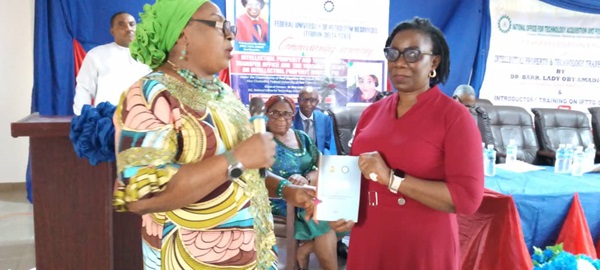
The National Office for Technology Acquisition and Promotion (NOTAP) has inaugurated the 65th Intellectual Property and Technology Transfer Office (IPTTO) at the Federal University of Petroleum Resources (FUPRE) in Effurun, Delta State.
The commissioning is part of the 67 IPTTOs established across the country to bolster the intellectual property (IP) system within Nigeria’s knowledge institutions.
During the commissioning ceremony, the director-general of NOTAP, Dr. Obiageli Amadiobi emphasised the critical need to strengthen the intellectual property framework in academic institutions. She highlighted that NOTAP was initially set up to regulate the influx of foreign technology through the registration of technology transfer agreements but its mandate has since expanded to include promoting the development and domestication of indigenous technologies. The office identified a significant gap in the IP system within Nigerian institutions, a shortfall that Amadiobi stressed must be addressed for Nigeria to become a global player in the science, technology and innovation (STI) sector.
Amadiobi pointed out that, in developed countries, academic institutions play a crucial role, not only in sustaining their economies but also, in enhancing the gross domestic product (GDP) through research and innovation. She called on Nigerian institutions to focus on solving societal problems by producing technically skilled graduates capable of addressing developmental challenges, rather than just generating graduates who struggle to find employment. She urged institutions to shift towards market-driven research, moving beyond conventional research aimed solely at publications and career advancement.
The director-general expressed concern that, despite the importance of patents as a first step toward commercialising inventions, many Nigerian researchers still leave their research and development (R&D) results on the shelves. She encouraged the FUPRE community to take advantage of the IPTTO by submitting their research outcomes to NOTAP for patenting, a service offered at no cost to the institution. Amadiobi reiterated that, although intellectual property is intangible, it must be protected to grant the inventor a monopoly on the financial benefits of their innovations.
Amadiobi affirmed NOTAP’s commitment to fostering a culture of innovation and invention among Nigerians through strategic advocacy on the importance of research in developing a robust intellectual property rights (IPR) ecosystem.
In his welcome address, the vice-chancellor of FUPRE, Prof. Akpofure Rim-Rukeh represented by the deputy vice-chancellor of administration, Prof. Doris Fovwe Ogeleka described the establishment of the IPTTO as a dream come true. He noted that the centre would expedite the evaluation and application processes for intellectual property at the institution.
Rim-Rukeh shared that FUPRE, established in 2007 with four colleges, was founded with the vision to become a premier international institution offering world-class education, training, research, consultancy and extension services in the petroleum and allied sectors. He emphasised the university’s commitment to producing high-quality human resources to enhance local content in Nigeria’s oil, gas, and energy industries.
The vice-chancellor proudly stated that FUPRE is the first institution of its kind in Nigeria and Africa, as well as the sixth globally, and has consistently lived up to its founding principles. He highlighted that, even before the IPTTO was established, FUPRE had engaged in critical research that led to one international patent and 33 national patents, with some of these inventions already commercialised.
Rim-Rukeh informed the visiting NOTAP team that the university houses 15 centres of excellence, with plans to establish more to further develop intellectual property awareness within the academic community. He expressed his gratitude for the IPTTO, challenging the university community to produce commercially viable research and development (R&D) results that benefit society.
In her presentation titled “Intellectual Property Assets Management,” the director of technology acquisition and research coordination (TARC), Mrs. Caroline Anie-Osuagwu defined IP assets as collections of intellectual properties, including patents, trademarks, copyrighted works, industrial designs, geographical indications and trade secrets, chosen strategically for their business value. She urged researchers to protect their inventions to benefit fully from the financial returns of their innovations. In a statement released by NOTAP’s assistant chief information officer, Raymond Ogbu, Anie-Osuagwu encouraged researchers to secure their intellectual property rights to capitalise on the financial rewards of their works.


